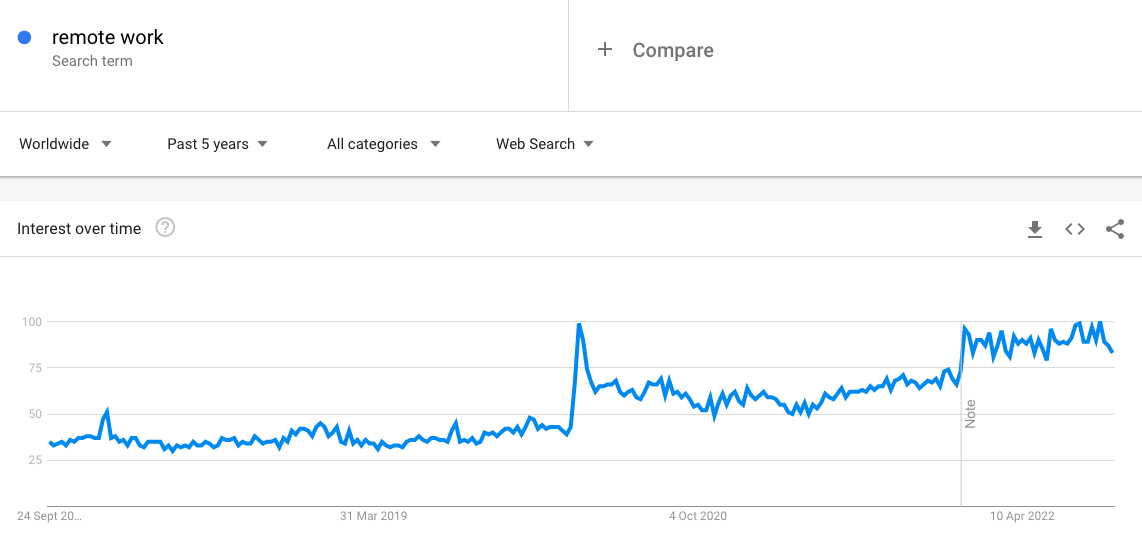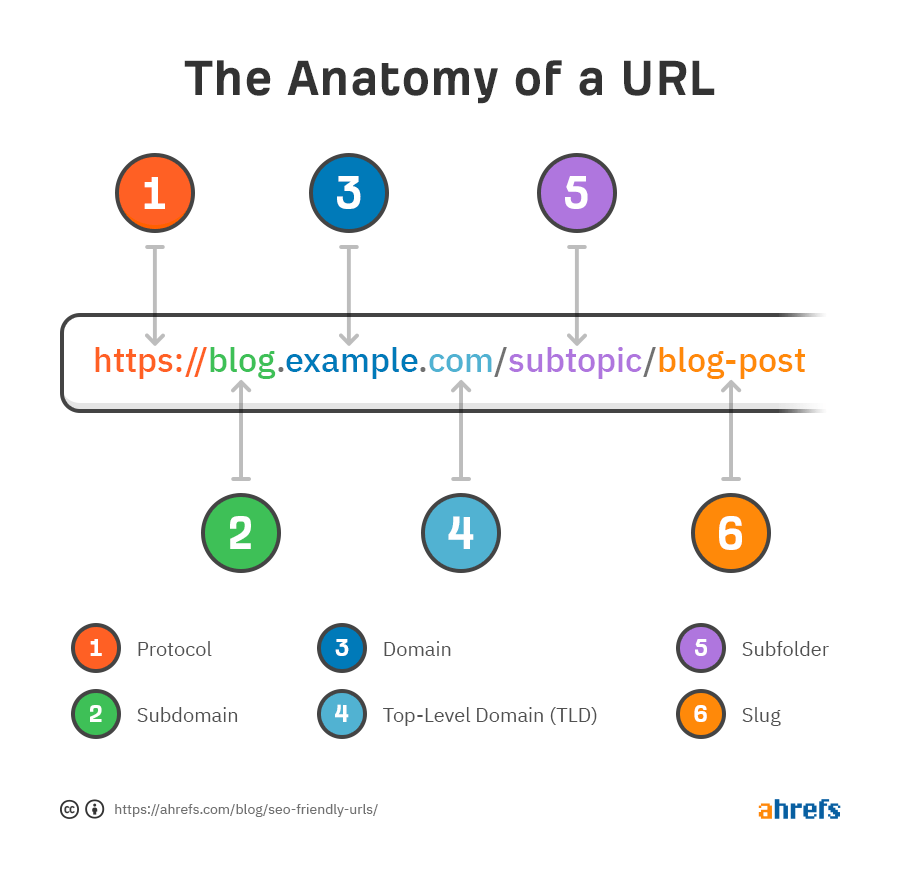Best SEO tips for freelancers: How to bring in new clients from Google

on September 21, 2022 • 7 minute read

Building a blog or portfolio website is among efforts freelancers tap into to build your branding and increase your visibility on organic search, ultimately bring in new clients. Ranking in the top positions will help with lots of returns because you get more chances to showcase your freelance work and get in front of prospective people when they search for you or services you provide. Only when you consistently optimize for your pages and build up ranking can you start to see amazing long-term results. Let's get started with this SEO guide with steps and tips to jump onto coveted ranking positions for your freelance website.
1 - Use tools to plan your content and measure your SEO efforts
Google Trends
People are home, meaning they are browsing more online.
Monitor Google Trends for newly searched questions and topics. People are at home looking for answers within your industry.
If you can recognise the newer trends that are relevant to your business, then you can begin to tailor your content around these topics - picking up new visitors to your website.
When demand rises, your website will be ready with the right relevant content proving to be an invaluable resource. Plus, you’ll be boosting dwell time on your website, which is a critical factor in search engine algorithms.

Google Search Console
Monitoring Google Search Console means that you can view what queries and keywords your website is being ranked for. Other third-party tools do this better, yet GSC is free to use.
Now, demand for products and services are shifting, so are search queries - and this will reflect in either a loss or boost to the search keywords you initially ranked for.
If your rank improves - then look at the page that is ranking and modify it to improve its chances of increasing to the top positions. If a page has lost rankings - edit or optimize it to reflect better search interest. You can also spot keywords that bring in the most traffic and consider writing more about them or placing call-to-actions on high-traffic pages to capture people's intent.
If you aren't monitoring this carefully enough, you'll miss opportunities to remain ahead of the competition.
2 - Develop SEO content for your freelance website
Consumer behaviour is shifting, and the pandemic has forced clients, customers and consumers to search and behave differently.
If you have more time, then start writing.
The aim here is not to think in the short-term - it is to get you ranking in the future for your products and services. And a little tip here, write a blog article based on research with a clear "how to do" concept.
This will be more valuable than writing a BuzzFeed style article on how "Apple is responding to the coronavirus pandemic." That article title will cease to exist as soon as the crisis subsides.
Aim for 1,000 to 2,000 words - they rank better for four reasons:
- it contains more words, so includes more keywords
- longer content generates more shares
- longer content boosts your sites topical relevance
- longer content keeps readers on your page for longer
According to SEO and content specialist Brian Dean, the average word count of a Google first page result is 1,890 words.
As always, 2-4 long-form articles a month is better than five shorter written newsfeed style articles per week—quality definitely matters over quantity.
Whilst this content will not convert in the short term; it will draw consumers into the sales funnel to present your company's services and products.
By having a stockpile of long-form content ready to publish ahead of time will make it easier to outrank your competitors.
It's also a good practice to write about topics that are relevant to your business or services you provide as a freelancer, because that way it's easier and more natural to tuck into your services in the copy and importantly, attract the right clients.
SEO keyword optimization for your freelance website
One way to go about it to build a backlog or small spreadsheet file to list content topics you want to write about or ones that are relevant to your freelance business and your clients will search for them on search. For each topic, define its primary keyword which will be the main keyword you want to rank for and optimize it on key on-page elements (title, URL, headings, keyword density, etc,) and secondary keywords that you cover them in the page and are related to the main topic. Some keywords may have big search volume when you check them in keyword research tools like Ahrefs, some have low or even zero volume because they are too niched and narrow but go for it if it's something core to your business or close to your heart. You can plan SEO content for your freelance website with that file for months ahead so it's worth sitting down for a 2-hour session and lay things out.
3 - Use videos to boost SEO traffic
Newer ways of working have led to more modern methods of communicating content.
With significantly more of us streaming and watching YouTube right now, start making video content to take advantage of this.
I've even seen it myself, where business owners have begun to record home videos of themselves discussing topics from coping with family at home to "how to do x, y and z on Facebook."
People are searching for answers online, and video content is one channel to reach your target audience. And consider these stats:
- 1 in 4 shoppers uses YouTube to search for a video related to a product they're considering while in-store.
- 42% of shoppers would like to see more product description and service demonstration videos.
- 73% of consumers are more likely to purchase after watching videos that explain a product or service.
- 74% of B2C marketers and 92% of B2B marketers use video in their marketing efforts.
Source: Video Marketing Statistics.
When planning video content, you can also consider producing videos to walk people through solutions to solve your target clients' problems, showcasing your specialization and gain people's trust before they decide to do business with you. It's easy to just produce and publish videos that target wide and average audience but the majority of them won't be your clients so having your specific target audience in mind when making the videos will go a long way in helping you reach the right people.
4 - Educate yourself about SEO
The current period of reduced work is an excellent time for e-learning.
Many outlets have given away free access to help business owners enhance their knowledge about SEO.
- Moz is now offering all its courses for free on the Moz Academy.
- SEMRush has free digital marketing courses online.
- Ahrefs (one of SEO tools we use on a daily basis at Xolo) is now offering their Blogging for Business course free of charge.
Learning to do SEO right is a long journey but apply things as you go and before you know it, SEO may already lies in your freelance service stack.
5 - Consider using heatmaps to improve organic conversion
Maybe the pandemic, the strong competition or looming recession has caused your site to lose web traffic; maybe it has increased. Whatever the scenario, now you should assess what your visitors do on-site.
Consider using a heatmap to do a deep dive into your website navigation.
You can use heatmaps for its various analytics but more useful is to track and view specific on-site visitor behaviour:
- Where are visitors clicking on a page?
- How far do they scroll?
- Which pages seem to be getting the most traction?
- Where are they leaving the page?
From the data, maybe you could consider making a page stand out more if it gets many clicks and optimize better for elements that people notice more than others. You can also check visitor's scroll to make sure important information, CTAs are placed within people's scrolls.
Whether this traffic converts into sales or leads, or you see an increase in searches to your website, it can still highlight some great insights.

6 - Optimize for your freelance website's technical SEO
You can also go beyond keyword optimization, link building and optimize for your site's technical. If on-page SEO and link building will help you reach more eyes on search, technical SEO make sure google search engines like Google can crawl and understand your content and structure without any technical issues. Here's a quick checklist whenever you want to give your site's technical SEO a check:
Page speed
For years, Google has emphasised site speed is a ranking factor.
SEOs have conducted their own research and observed that those websites that load in 10 seconds or less saw a 123% likelihood of visitors bouncing off the site.
Google's PageSpeed Insights is a free tool to check your website's page speed on both desktop and mobile with suggestions on how to improve. If your website has many pages, you can also have a bird's view of all pages' pagespeed performance in Core Web Vitals report under Experience in your Google Search Console account.
Some tips for you to reduce pagespeed and prevent people from bouncing off is to get rid of unnecessary plugins if you use CMS like Wordpress, limit the usage of redirects for internal linking on your page, reduce the size of image files or in a word, trim down elements that are redundant on a webpage.
XML sitemaps
Search engines need to be able to read websites easily. XML sitemap, a file listing all important pages of a website will help search engines discover and go through all pages in a more efficient way. For CMS like Wordpress or Hubspot, you'll be able find many plugins that help to automatically generate sitemap files whenever you publish something new. If you prefer to do manually, you can use online tools which you need to enter your domain name and they'll create the sitemap file in minutes.
Once you your XML sitemap file is ready, submit it to Google Search Console.
URL structures
Keyword-relevant URLs have been an effective SEO strategy for years. Some research even indicates that using shorter URLs may lead to higher rankings.
While there's no word limit, Google has indicated in the past that the first five words (or the first 512 pixels) are given more credit, anything after is truncated or ignored.
When a search enquiry is presented to search engines, search engine crawlers scan the words at the beginning of the URL to check for topical relevance against the search term.
So if you have long URLs, containing stop words, dates and numbers, consider tidying them up.

User-experience & site navigation
How easy is it for your visitors to find what they need on your website?
If it is not immediately obvious what product or services you use, or where to locate other information - users will quickly bounce off the page.
If too many people bounce off your page, then search engines see this as a site with a poor user-experience and topical relevance.
Make sure your website has a clear top-level menus, with dropdowns, where to login and sign up.
Ensure the footer section is up to date with links to other pages on your website, and never hide a contact page. People love to be able to contact a company directly.
If they cannot locate it, they will find a company that will.
7 - Delegate SEO tasks to SEO freelancers
If it sounds like a lot of work for you and you prefer to focus on your core specialization, you can also consider hiring SEO freelancers who can help you grow your website and boost the organic traffic. You may need a full-time SEO manager, SEO consultant or a freelance SEO specialist who can support you for a few hours per week. Connecting and finding SEO freelancers won't take you lots of time as long as you set clear expectations and have some short bullets of specific tasks you need help with.
Skyrocket your website traffic and find your target freelance clients
I've been told many times, "we know we need to do SEO, only the results take months to show."
Well, those clients of ours who did this last year are in a better position now, ranking better online.
SEO can take a minimum of three months to begin showing the results - so now is the prime time to start making site amendments and optimization for long-term dividends.
David Bailey-Lauring is the co-founder of Blu Mint Digital, a digital marketing agency headquartered in Tallinn, Estonia. David is passionate about SEO and content marketing and is a proud Xolo customer.
Related blogs
Subscribe to our newsletter
Get the latest updates and expert business tips straight to your inbox.

